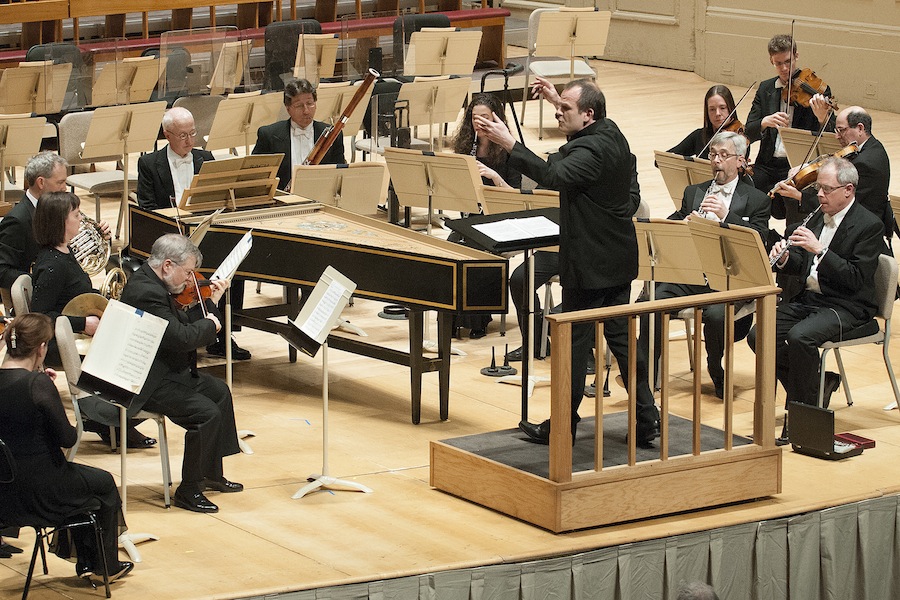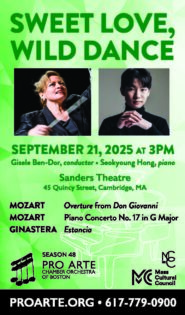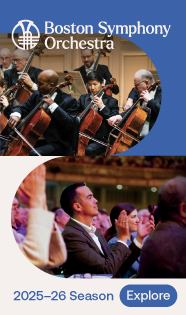Tanglewood Festival Chorus shines brightly in Stravinsky with BSO

François-Xavier Roth led the BSO and soloists in Bach’s Brandenburg Concerto No. 1 Thursday night at Symphony Hall. (Stu Rosner)
Music is powerless to express anything at all, or so thought Igor Stravinsky. “If, as is nearly always the case, music appears to express something, this is only an illusion,” the composer noted in 1935.
The illusion of expression is indeed a powerful one in the last movement of his Symphony of Psalms. Set to Psalm 150, the music captures all the exuberance of the zealous praise described in the verse. The composer even wrote that the final hymn “must be thought of as issuing from the skies.”
Symphony of Psalms, originally commissioned by Serge Koussevitzky for the fiftieth anniversary of the Boston Symphony Orchestra, returned to Symphony Hall Thursday night as part of a varied and highly expressive program. François-Xavier Roth, standing in for an ailing Daniele Gatti, led the way in his BSO debut.
To remove any hint of romanticism, Stravinsky substituted two pianos for the violins and violas in the score to his choral symphony. But that didn’t keep the BSO and Tanglewood Festival Chorus from rendering the music’s cool, mechanistic statements with inviting warmth.
The singers were in fine form, giving their phrases glorious tone and strength. The soft “Alleluias” that pepper the final movement were sumptuous. The austere mingling lines of the top-to-bottom fugue of the second movement, a setting of part of Psalm 39, sounded lush. Topping it off were the BSO winds, who pulled off the oom-pahs and disjointed burbles with finesse.
For all the attention given to Beethoven’s music, the BSO, until now, has never performed the composer’s Elegiac Song. This lovely work for chorus and string orchestra (originally scored for string quartet and voices) was a memorial for the second wife of Beethoven’s landlord, Baron Johann Pasqualati.
With gentle waving gestures, Roth pulled tender phrases from the orchestra and chorus. The singers delivered the lines of the brief elegy with crisp diction and glowing tone.
The evening began with Bach’s Brandenburg Concerto No. 1 in F.
Of the six concerti Bach wrote for the Margrave of Brandenburg, the first contains the thickest orchestration. The solo instruments—piccolo violin and a band of horns, oboes, and bassoon—spin their melodies with each other as well as with the strings and continuo for rich musical dialogue, a sort of concerto for orchestra in miniature.
That was especially evident in the slow movement. Oboist John Ferrillo traded elegant phrases with Daniel Phillips’ piccolo violin. The strings blanketed the winds with plush ensemble sound. Roth led the double minuet and trio that concludes this concerto with gentle lilt, and the polonaise that stands at the center of the movement moved with supple flow.
Delightful as it was, the soupy texture made it all too easy for the musicians to blur their phrases in the quicker movements, and the music, as a result, lacked the idiomatic clean cut of Baroque style. The lines of opening Allegro sounded milky. In the third movement, Phillips suffered some misses and squeaked notes early in his solo. Hornists James Sommerville and Rachel Childers also had trouble lining up their phrases with Phillips’ violin.
Precision playing returned by evening’s end with a lively reading of Beethoven’s Symphony No. 4 in B-flat.
The Fourth Symphony, sandwiched between the Promethean Third and teleological Fifth, may seem like a throwback to earlier forms. But the music has plenty of bite despite its formal restraint and overall sense of optimism.
The smooth energy of the first movement continued into the Adagio as Roth leaned on the throttle for a confident reading. The waving, lyrical lines sparkled with detail. Subtle shifts in dynamics shaped the bubbly phrases of the Scherzo, and a brisk tempo transformed the finale, marked Allegro ma non troppo, into a show-stopper, the lines percolating like country fiddling.
The program will repeat 1:30 p.m. Friday and 8 p.m. Saturday at Symphony Hall. bso.org; 617-266-1492
Posted in Performances


Posted Apr 12, 2014 at 11:02 am by Jon Richardson
What is wrong with the violin used by Phillips? the performance on Friday was pure agony to hear- squeaky beyond belief- surprised the conductor didn’t stop the performance
Posted Apr 13, 2014 at 9:01 am by jliu
It is surprising to see the article published on Friday already pointed out the mistake of the violin. I do not know why Phillips repeated the mistake on Saturday night. Are they following a different version of the music score? I noticed that the tempo was very fast, maybe this overwhelms the violinist?